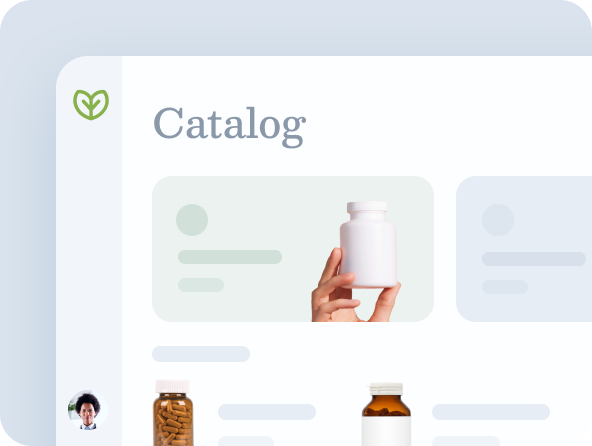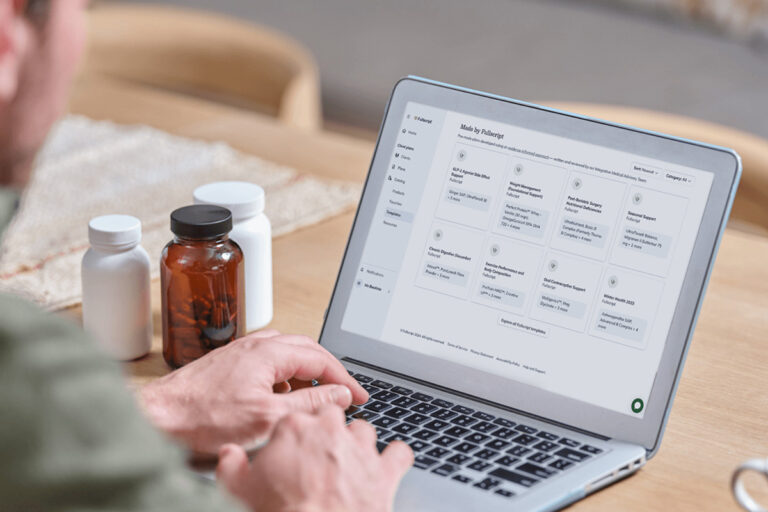You have likely come across DHEA or its metabolite, DHEA sulfate, in some way, shape, or form. It may have been at your local health food store or pharmacy in supplemental form or even at your favorite cosmetic store as DHEA cream. You may have also heard of its potential positive effects on aging skin (5) or that DHEA can be used to build muscle strength because of its ability to boost testosterone. (23)
But you may still be left wondering, what is DHEA, and how can it have such a variety of benefits for both men and women? Continue reading to learn everything you need to know about DHEA, from what DHEA does, and whether or not it may be beneficial for you.
If you’re a practitioner looking to recommend DHEA supplements, create a free Fullscript account today.
Try Fullscript for free
What Is DHEA?
Dehydroepiandrosterone, more commonly known as DHEA, and its sulfated metabolite DHEA sulfate (DHEAS) are the most abundant hormones in the human body. (17) Like many other hormones, DHEA is predominantly synthesized in the adrenal glands, small triangular glands that sit on top of our kidneys. DHEA is also synthesized in the brain, both male and female reproductive organs, and adipose tissue, a form of specialized connective tissue that makes up about 25% of our body weight. (5) The body makes DHEA using the precursor pregnenolone, another naturally occurring steroid hormone derived from cholesterol. (12)

What Does DHEA Do?
While there is limited research about DHEA and its various functions, it is understood that the DHEA produced by the body is used to synthesize androgens, such as testosterone and estrogen, in the form of estradiol. (12) This is important because both testosterone and estrogen play vital roles in sexual function, energy, and the maintenance of healthy bones and muscle. (3)
DHEA Benefits
DHEA is a hormone responsible for several functions in the body, including the synthesis of other hormones. For this reason, treatment with DHEA may be beneficial for individuals who suffer from various hormone and age-related conditions.
1. Helps with Adrenal Insufficiency
A double-blind, placebo-controlled study involving 24 women with adrenal insufficiency found that taking DHEA supplements improved well-being and sexual function. In the study, the women received four months of treatment with DHEA and four months of placebo, with a one-month washout period, during which participants stopped taking DHEA in order to eliminate its effects. It was found that DHEA intake raised the initially low serum concentrations of the hormones DHEA, DHEAS, androstenedione, and testosterone to normal levels. Moreover, DHEA intake significantly improved overall well-being and psychometric assessment scores for depression and anxiety. Furthermore, DHEA significantly increased both sexual interest and the level of satisfaction with sex. (1)(5)
DHEA was also beneficial for women suffering from adrenal insufficiency due to hypopituitarism by increasing thyroid and adrenal function. (5)(10)
2. Supports Bone Health
There are several reasons DHEA may play a role in the maintenance of healthy bones. Firstly, the end products of DHEA, specifically estrogen and testosterone, increase the activity of osteoblasts, the cells that produce bone. (11) Multiple studies have also noted a strong correlation between DHEA and bone mineral density (BMD). DHEA’s role in BMD is likely because of DHEA’s ability to increase insulin-like growth factor 1 (IGF-1), a hormone that, along with growth hormone (GH), helps promote normal bone density and tissue development, along with growth, and healing. (11)(15)
3. Depression
Low levels of DHEA have been associated with a higher prevalence of depressive symptoms and poor scores on the Mini-Mental State Examination (MMSE), a standardized test used by clinicians to assess memory and cognition in elderly individuals. (2)(5)
In an open-labeled study involving three men and three women, DHEA proved to have beneficial effects on symptoms of depression. The participants took individualized doses of DHEA for four weeks, which resulted in improved scores in the Hamilton Depression Rating Scale and other standardized depression rating scales. The improvements were related to the increased levels of circulating DHEA and a higher DHEA to cortisol ratio. (12)(24)
4. Can Be Used to Treat Human Immunodeficiency Virus (HIV)
HIV-infected patients have far lower DHEA levels than control subjects. Moreover, DHEA levels seem to decrease as the disease progresses. (8)(12) There is some epidemiological evidence that low DHEA plays a role in the progression of HIV infection to AIDS. (6)(12) DHEA has been used to treat HIV-AIDS in conjunction with antiviral treatment. (8)
5. May Be Able to Treat Systemic Lupus Erythematosus
Systemic lupus erythematosus (SLE) has also been associated with low circulating levels of DHEA. A double-blind, placebo-controlled, randomized trial included 28 women with mild to moderate SLE who were given DHEA for three months. Patients who received the DHEA had fewer flare-ups and required a lower medication dosage compared to the control group. (12)
Another randomized, double-blind, placebo-controlled trial looked at the effects of DHEA in 120 female patients with mild to moderate SLE. DHEA was given to 61 patients and a placebo was given to 59 patients over a six-month period. Similarly, there was a significant decrease in the number of lupus flare-ups in the group receiving the treatment (18.3%) versus the control group (33.9%). (7)(22)
6. May Support Reproductive Health
DHEA may also help to improve female sex hormones and sexual function in both pre- and post-menopausal women. An observational study was conducted to investigate the effects of DHEA supplementation on female sexual function in premenopausal infertile women. The study involved 87 women, 50 of whom completed the study, including the Female Sexual Function Index (FSFI) questionnaires and a comprehensive endocrine evaluation before, halfway through, and at the end of the eight-week study period. The study results showed that desire increased by 17%, arousal by 12%, and vaginal lubrication by 8%. Interestingly, the women who had the lowest initial FSFI scores experienced the most significant improvements, experiencing 54% more orgasms, 24% greater satisfaction, and 25% less pain during sex. (13)
7. Promotes Overall Well-Being
Supplemental DHEA may also provide benefits for overall well-being. A Cambridge University study involving 140 women aged 40 to 60 involved collecting blood samples to monitor serum hormone levels and conducting interviews using the Multiple Affect Adjective Checklist (MAACL), a standardized scale used for the diagnoses of mental health conditions. Using the participants’ scores on the MAACL, researchers found that DHEA levels were positively correlated to an increased sense of well-being. (4)
Similarly, DHEA supplementation may also improve well-being in men. A double-blind, cross-over, placebo-controlled trial found that taking oral DHEA dietary supplements for three months raised DHEA levels in older men and women to levels seen in younger adults. The elevated DHEA and DHEAS levels, in turn, resulted in a significant increase in perceived physical and psychological well-being for both men (67%) and women (84%). (18)
What Causes Low DHEA?
Our bodies naturally produce all the DHEA we need; however, certain factors can affect our body’s ability to produce DHEA.
1. Age
Although there is limited research on the topic of DHEA, we know that DHEA levels decrease as we age, which is why it is often referred to as the “hormone of youth.” As we get older, DHEA levels can drop to as low as 10 to 20% of levels found in younger individuals. (21) A study conducted using samples from 412 male and 395 female healthy blood donors found that DHEA levels peaked at age 20 to 29 years old in men and 17 to 19 years old in women, at which point they began declining linearly with age. However, female samples showed a slight increase between ages 35 to 44, likely due to the onset of perimenopause, where menopausal symptoms began to present themselves, after which the decline was more rapid. (25)

2. Illness and injury
Both critical illness and physical injury such as burns have been linked to a reduction in DHEA and DHEAS levels. (14)(19) A study that assessed DHEA levels in men following the occurrence of severe burn injury found that by the tenth day, those who had suffered severe burn injuries had significantly lower DHEA levels than healthy men. (14) A replication study involving both male and female burn victims also found similar results. (16)
How to Increase DHEA Levels Naturally
1. Exercise Regularly
In addition to its positive effects on body fat, twenty minutes of exercise at 80% of your maximum heart rate can also increase your DHEA levels 1.5 times following exercise. Some evidence suggests that higher serum DHEA levels from regular physical activity may help the body adapt to physical and psychological stress. Scientists believe that this effect is attributed to a higher DHEA-S to cortisol ratio. (9)(12) However, more research involving larger sample sizes is still required to fully understand the exact role DHEA plays in response to stress. (12)

2. Follow a Plant-Based Diet
There is evidence that suggests a predominantly plant-based diet may help regulate DHEA as well as other hormones. A controlled experimental diet study found that plasma levels of DHEA were higher in the subjects who consumed a vegetarian diet than those who consumed a diet of meat-based protein. (20)
3. Take DHEA Supplements
Taking DHEA supplements can also be used to increase DHEA levels if needed. Always speak with your integrative practitioner before adding supplements to your wellness plan.
Does DHEA Have Side Effects?
Research suggests that supplemental DHEA may be taken safely orally for two years. Since DHEA can elevate testosterone and/or estrogen, the most common side effects can include:
- Abnormal hair growth
- Acne
- Breast pain or breast growth in men
- Changes to the menstrual cycle
- Deepening of voice
- Upset stomach (5)
The Bottom Line: DHEA Supplements Can Help with Certain Health Conditions
Taking DHEA supplements is generally safe and may benefit older adults, postmenopausal women, and those with certain health conditions, such as adrenal insufficiency, depression, and certain autoimmune disorders. DHEA should not be used for those who may have a predisposition for hormone-sensitive cancers or polycystic ovarian syndrome (PCOS). (5) If you’re a patient, please speak to your integrative health care provider before taking DHEA supplements to ensure they’re right for your treatment plan.
If you’re a practitioner looking to recommend DHEA supplements, create a free Fullscript account today.
Try Fullscript for free





